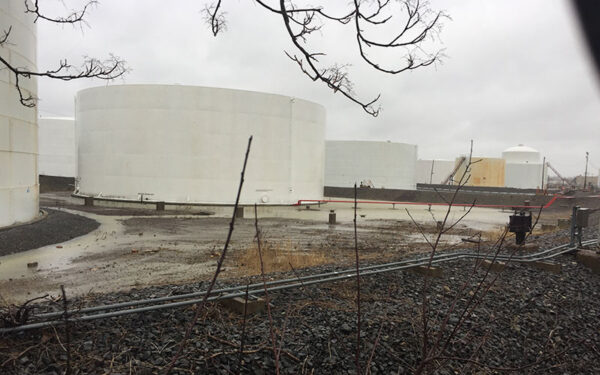
While we all turn up the heat during New England's classic frigid winter, ISO-New England warns of mythical rolling energy blackouts that have never happened in the region. Photo: Shutterstock.
CLF has long called out bad actors whose actions (or inactions) harm our communities and environment. ISO-New England, our regional electricity grid and markets manager, shouldn’t be one of them.
However, the harm ISO inflicts runs even deeper and often manifests in subtle ways. Its history of scare tactics that prop up opponents of state climate solutions is just one of them.
We saw an explicit example of this last month when a coalition of New England oil dealers committed what may well be 2021’s greatest act of climate hypocrisy. They crafted a letter justifying continued addiction to their dirty products, parroting all-too-familiar fear-mongering messaging used by ISO.
Crying Wolf (Again) in 2022
In December, this coalition of oil dealers sent an SOS to each New England governor. They warned that state programs to promote electric heat pumps for home and business heating must be “ceased immediately.” They falsely claimed that the kind of extreme weather that shut down Texas’ electricity and gas systems last February could hit New England this year. And that only firing up more climate-polluting heating oil would spare the northeast from the same unfortunate fate that befell the Lone Star state.
The oil dealers aimed at heat pump programs because transitioning to electric heat is at the center of our states’ strategies to cut climate-damaging emissions. Heating our homes and buildings with electric heat pumps poses a threat to Big Oil, as it means moving away from gas and oil in favor of clean energy sources. With its back up against a wall, the gas and oil industry is making a last-ditch effort to defend its market share with this weak stunt.
The coalition’s logic has the circularity of a Texas two-step: to avoid risks posed by severe weather, we must burn more fossil fuels. But that severe weather is driven by climate change – which is caused by burning those very fossil fuels.
Not to mention, New England long ago took measures to avoid the system disruptions that plagued Texas. The region has guarded its system against cold weather threats, including allowing for backup energy supplies.
What’s more, Texas has historically refused to cap its energy prices – unlike New England. That freedom allowed the oil and gas industry to price-gouge at a time when Texans were most vulnerable. The skyrocketing electricity and gas costs Texans suffered last February resulted largely from the unbridled greed of the fossil fuel industry – a fact conveniently omitted in the oil dealers’ letter to our governors.
The misleading messages of fear peddled by oil and gas would not be newsworthy or catch the attention of our politicians if not for one critical factor. They echo the anti-clean energy rhetoric of a supposedly credible source: ISO-New England.
Big Oil Preys on ISO’s Forecasts of Fear
As it has for the better part of a decade, the oil and gas industry is parroting the words of our region’s grid and markets manager to scare us into a fossil fuel future.
ISO’s anti-clean energy rhetoric follows the same pattern every year. It begins at the start of the winter season when ISO issues its annual “Winter Outlook.” The Outlook is intended to help inform and, to some extent, forecast what electricity system, market performance, and costs will look like in the coming months. For years, but particularly since the Polar Vortex of 2013–14, ISO has used the Outlook as a tool to lobby (rather, scare) the region into continued reliance on fossil fuels.
By now, we have come to expect ISO’s Outlook to tell us that gas power plants may not perform because we have not built enough gas pipelines into the region (something ISO actively lobbied for). That our homes and businesses may suffer rolling blackouts because we don’t have enough gas.
ISO says this even though blackouts have never happened in New England – including during that awful Polar Vortex. And the region’s electricity and market conditions have steadily improved since that Polar Vortex, making ISO’s doomsday scenario less likely than ever. Each time ISO makes these statements, the oil and gas industry jumps onto the bandwagon to amplify this fear-mongering and maintain the status quo of their polluting products.
This year’s Winter Outlook was no different. Forecasters predict a warmer than average winter. ISO has hypothesized that electricity demand will be about the same as the past four years. Regardless, it contracted for approximately 30% more power than its system has ever needed during winter (unnecessary power that you and I will pay for in our utility bills).
Despite this preparation, ISO still uses its very public platform to instill fear and urge more fossil fuel reliance.
ISO-New England Must Stop Its Misleading Rhetoric
While it says it is interested in accommodating states’ climate objectives, ISO does not consider slowing climate change to fit within its three primary functions. This tunnel vision too often leads ISO to impede rather than help advance the region’s climate laws and policies.
So how is it that ISO-New England, a nonprofit corporation prohibited from political activity, can lend such weighty support to an industry whose interests run counter to New England’s climate goals? The answer lies primarily with ISO’s misplaced belief that it serves only three roles: to keep the lights on, to manage electricity prices, and plan the future of the region’s electric system.
That’s why, last year, all six New England states urged ISO to include climate in its mission statement. They also asked ISO to change how it manages markets and the electricity grid so that it can be part of the climate solution.
ISO has taken some modest steps in the right direction, mostly in response to pressure from the states and federal regulators. But their doom-and-gloom, “we need more fossil fuels” messaging every winter speaks far louder, especially when echoed by the oil and gas industry.
We face a winter with real potential for high heating and electricity bills due to the pandemic, severe weather events, and geopolitically caused oil and gas shortages. Our states are pushing hard to end the fossil fuel addiction that produces such unstable prices in the short-term – and certain climate damage over the long term. It’s time for ISO-New England to stop the misleading rhetoric that provides fodder to fossil fuel corporate-culprits. It’s time for our grid operator to step up on climate or step out of the way.



